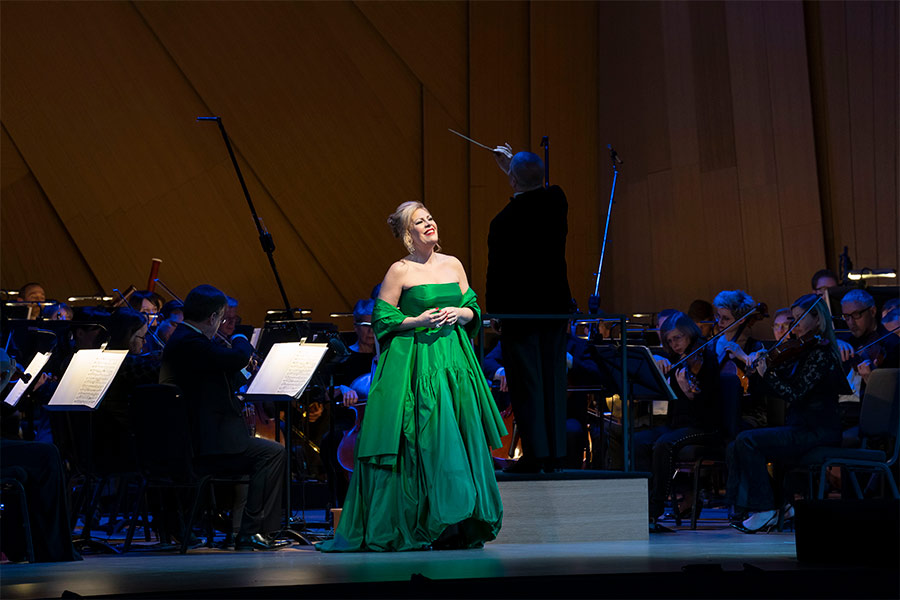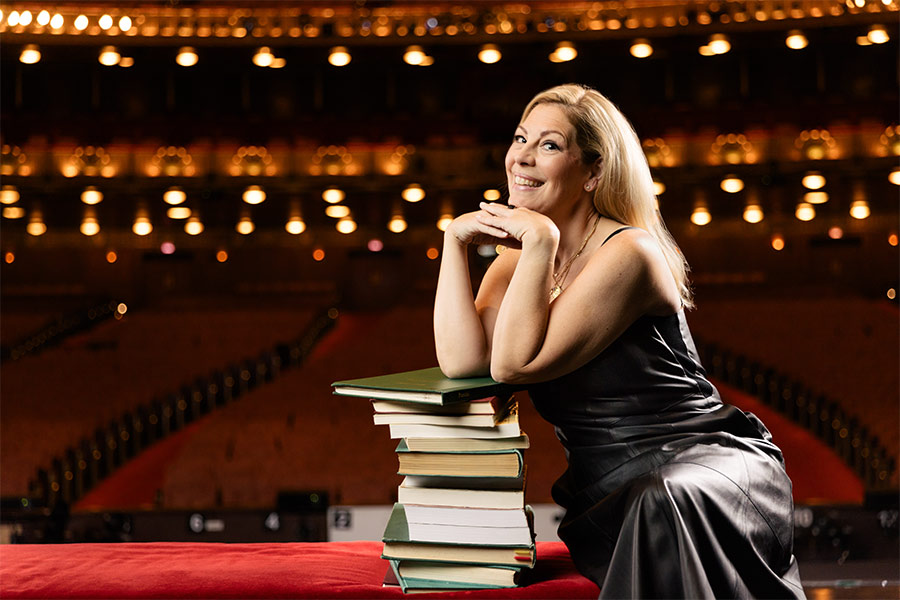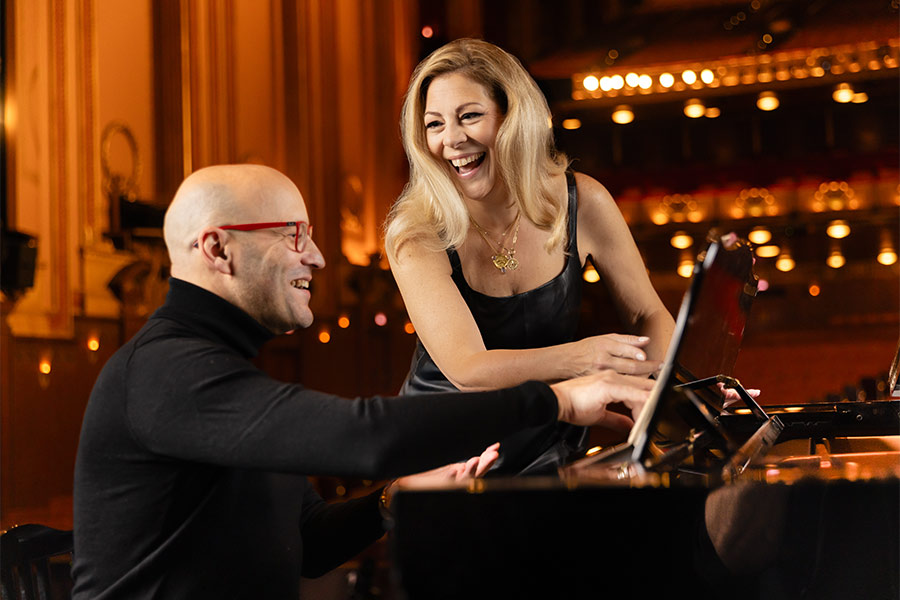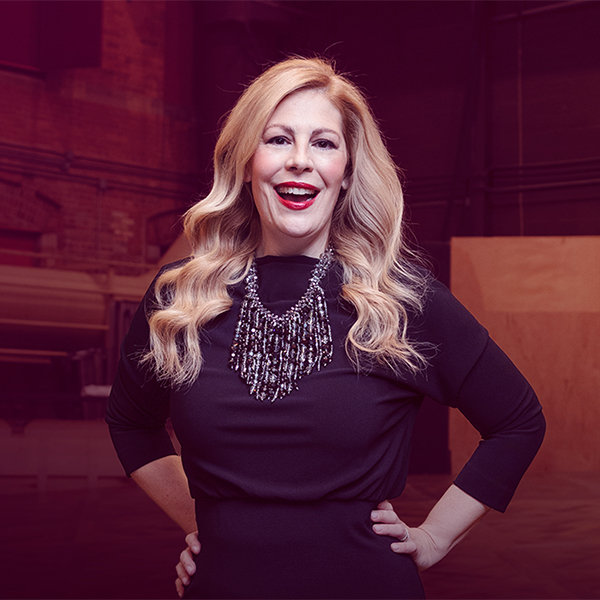January 24, 2025
Sondra Radvanovsky's Puccini Picks
Sondra Radvanovsky's triumphs in the operas of Puccini have included Musetta (La Bohème), Liù (Turandot), and the title roles of Manon Lescaut, Tosca, Suor Angelica, and Turandot. The world-renowned American soprano took a moment away from her recent European concert tour to discuss her longtime fascination with the indispensable composer and which selections audiences can expect to hear in The Puccini Heroines on February 8, 13, and 16.
You begin with "Se come voi piccina" from Puccini's first opera, Le villi. That's a work we don't know at all in America. What attracts you to Anna's aria and makes it not just a memorable aria, but the right piece to start the program?
It's a light, lyrical piece, first of all. I like to start programs with arias where vocally I'm not taxing myself too much. It's a lot of middle voice, which is good, creamy and yummy, to warm up the voice. Even though people aren't familiar with it, I'm actually hoping they'll come away from the concert humming this particular aria. I think it's one of the most underrated of all Puccini soprano arias, so creamy and lush.
You then move to Mimì's Act-One aria, "Mi chiamano Mimì." Of course, early in your association with the Met you sang Musetta there, at age 21, but have you done Mimì since that experience?
No, never again, but I've coached a lot of young singers in "Mi chiamano Mimì." If one just listens, it sounds like a very simple aria, but it carries a lot of information, and it so beautifully sets up the character and how the director wants the soprano to play it. I've always thought of Mimì as a little shy, but I think she knows something's going on with her health right from the beginning. She's lonely, she doesn't want to die alone, and she wants to feel love at least once in her life. That's my idea of how I come into the aria. I always think about the acting side of things; for example, what is in her purse? What is she carrying with her that's important? She talks in the aria about sewing — I think that's a very important part of the aria to emphasize. Once again, Puccini gives it all to you right there. He's writing this melody, but then he pauses so she can say to Rodolfo, "Vivo sola, soletta" ["I live alone, all alone"]. But why did she say that? Does she actually mean, "Are you listening? Am I boring you? Should I just leave now?" She's a very modern character, and I've loved coming back to her.

Sondra Radvanovsky performs with the Lyric Opera Orchestra at the Renée Fleming 25th Anniversary concert.
The concert includes "Un bel dì," the heroine's aria from Madama Butterfly. You haven't played Butterfly onstage, correct?
Correct. It's a role that kind of got away from me. I'm still looking for at least a concert version. I'm nothing at all like the character, but I'd love to sing her — all 5-foot-9 of me!
Kate Pinkerton was one of your roles during your tenure with the Met's young-artist program. What do you remember from observing someone play Butterfly onstage?
I was fortunate to be able to watch Michele Crider. What a phenomenal singer — there was so much emotion in her performance! Butterfly is all bottled-up emotion, because of her culture. One can't go over the top with emotion when playing her. Everything has to be within boundaries. Butterfly is a peek into cultural differences, and how in one culture something can be completely normal, while in another one you have to take your life because of it. That's what struck me about Butterfly, and how every night Pinkerton gets booed, because American audiences think of him as a bad man. I remember having a conversation with Renata Scotto about this role, and Mirella Freni as well, two of the greatest Butterflys. They both said, "You have to walk on that stage, and while you're there you have to think about your shopping list, or else you cannot stop crying." Renata Scotto found that she couldn't think about the character because if she did, being a mother herself, she'd cry through the whole opera.
Butterfly is a perfect example of a particular manner of posture and movement being closely associated with a particular character. But you’re performing “Un bel di” in a concert situation — how specific do you want to be in your physical characterization?
It’s something I still haven’t decided upon, because as a 55-year-old, 5-foot-9 white woman, do I take on the mask of a Japanese woman? Or do I just use my personal gestures, my history as Sondra, and play it from there? I don’t know at this point what the right answer is, because I want to do justice to the character, the culture, the music, and the storytelling. That’s the most important thing to me right now — always telling the story. So can I dig into my own past and use my own vocabulary or not?
Next in the program is Tosca, a signature role of yours in major opera houses all over the world. What keeps you coming back to her?
She is me— that's the beauty of playing her. I'm a different person every day. Some days I feel feisty and full of fire, some days I'm angry, and some days I'm happy. This is the role where I can really use my acting chops. If you have a colleague onstage who can match that — like a Bryn Terfel as Baron Scarpia — then for me it really becomes like a game of cat and mouse, or like a tennis match where a rally goes on for a really long time. The problem is that I want to do every Tosca with Bryn! In this opera, the music in many ways is almost second to the acting and the storytelling.
What's most important to communicate to your audience in Tosca's Act II aria, "Vissi d'arte"?
I started out singing it like a prayer, but then I lost my mom to Lewy body dementia and Parkinson's — she suffered greatly. Why is there so much suffering in the world? That's the same question Tosca is asking in "Vissi d'arte." When I sing it I have nothing else in me, I am empty, I am bare, and I'm laying my soul on the stage. She says "perchè me ne rimuneri così?" ["Why do you repay me like this?"], and — it's probably me projecting — she feels, "God, why did You forsake me in these moments when I needed You the most? Where were You?" That's what I felt when my mom got Lewy body dementia and Parkinson's.
Manon Lescaut has been another big success for you onstage. Do Tosca and Manon have any traits in common?
Well, I do not feel that Manon Lescaut believes in God. If she does, she has kind of thrown up her chin and said, "Here you go, this is me, take me as I am." I think she's probably anti-God, because of the lifestyle she's led. If you were God-loving, you wouldn't need all the jewels and the wealth, and you wouldn't sell your body for all that.
But I also think Puccini was a hopeless romantic. He was also quite a womanizer, and a very "dapper Dan"! Puccini's soprano roles are always involving love in one way or another — every one of them. If you break Manon Lescaut down, it's all about love. When I play her, Manon is a girl who I think wasn't loved enough as a child, or wasn't loved properly, or was ignored. Then [when she meets Des Grieux] she actually finds someone who pays attention to her, and she feels this electricity with him. For Manon, it was enough for her to have love at least once in her life.
Manon has a pretty stunning character development, from where she starts the opera to where she winds up when she sings "Sola, perduta, abbandonata" in Act IV. At that point, do you think Puccini is able to create sympathy for her?
Yes, because Manon realizes the error of her ways, and her fear of dying. She sees her mistake [giving up Des Grieux to become the wealthy Geronte's mistress]. It's interesting that she doesn't sing "Sola, perduta, abbandonata" until Des Grieux leaves to go find water for her [when she's dying in the desert]. But most ill people don't want to die alone, and Manon is much the same. When they're alone they're reflecting on their lives, and that's what I think she does. She realizes she is going to die — the aria is a soliloquy, really. After that, she just goes into delirium. I don't feel this is Manon Lescaut anymore, it's a woman who is mostly dead — and I say that because I saw it with my mother as she was passing on. When Manon sends Des Grieux to look for water, the aria is really her last breath of life. After that, she's on the journey to wherever she's going. If one plays it that way, the audience feels for her, because she made a mistake that cost her her life. What a great character! Speaking of characters that go on a journey, I think all the Puccini women do that —Minnie [in La fanciulla del West] has a great journey — but I think Manon's journey is fabulous. It's all so real and raw. Tosca goes on a journey, too, and she also comes to the point where "I have nothing to lose because God has forsaken me."

Sondra Radvanovsky tackles some of Puccini's fiercest leading ladies in The Puccini Heroines this February.
You're an American woman with so much experience singing Puccini roles, but so far you've stayed away from his one American heroine. Is there any truth to the rumor that you're planning to sing Minnie (La fanciulla del West)?
It's true! I think it's next season. I sang the duet with Jonas Kaufmann this past summer. I have fingers crossed that there's going to be a recording with the two of us. I can say that we're in talks about it!
So how would you describe Minnie, in terms of her "American-ness"?
I'm thinking of how she protects her men at the saloon, when she talks about the miners' money that [the bandit] "Mr. Johnson" is actually there to steal. She says in her duet with him, which is so beautiful, "These men work so hard, this is their life, and I'm in charge of protecting them." That's very American, her taking care of the whole. I find that Americans are very "I've got your back" — isn't that a great American phrase?
At the same time, in the aria you'll be singing in the concert, "Laggiù nel Soledad," she's so sweet and feminine, and longing for love.
I think there's quite a bit of femininity that comes through in the aria, although I don't think she understands it. She's going through a huge awakening throughout the opera, which I think causes her to question her beliefs, her values, and her femininity. This is a very simple woman — in fact, she says that: "I'm a simple woman, I don't have an education, but I do know right from wrong." I find this so beautiful in her, because she does indeed fall in love with this man who's wrong! She's a very complex character.
I've seen words like "miraculous" and "revelatory" used to describe your LA Opera portrayal of the title role of Suor Angelica. I got a feeling from the reviews that, having established yourself in people's minds as a Verdi soprano, you were showing us that you'd become a major Puccini interpreter as well. Do you view the role as an important career milestone?
Yes, and for many reasons. It's when I found who I am as an artist — it was because of that role. That was greatly due to Billy Friedkin, the director, who passed away recently. He gave me probably the greatest thing I've ever learned about stagecraft, which is stillness. I say that as a girl who previously would flail around onstage and think that was acting! One day, as I was about to sing [the nun Sister Angelica's aria] "Senza mamma," Billy said to me, "Don't move, and think of your dad," because my dad died when I was seventeen. "That's all I want you do to with this aria." I did that in my very first day onstage in the role. Then, when I looked around and everyone was crying, I thought, "What did I do differently?" Billy said, "The power of stillness, Sondra, is incredible." I found it in that character, discovering that Suor Angelica was a woman who was very inner. It was a huge turning point in me because I trusted that stillness. Billy also said, "You have so much emotion in your voice, in your face — you don't need to shove it down our throats, Sondra." "Am I that bad?" "Yes! Stop it!" No one had ever told me that before. I owe Billy Friedkin so much that he allowed me to trust in stillness.

A Puccinian match made in heaven — Sondra Radvanovsky and Maestro Enrique Mazzola reunite for a dazzling concert of Italian music.
In the concert, you then move to a real rarity —"Addio, mio dolce amor" from Edgar. Have you seen that opera onstage?
No, I haven't, but I worked on it with Renata Scotto, who sang it.
The character, Fidelia, is your basic nice, sweet, devoted Puccini heroine. How can you make her three-dimensional?
To me, she's a bit of a conundrum. I don't know what Puccini was thinking when he wrote that opera, besides beautiful arias — after all, the baritone has "Questo amor"! In this case, though, I think he should have just stuck with writing the pretty melodies in that opera, because he really missed horribly in that story. I'm thinking, "This is just a girl in love and singing pretty!" I remember that Renata Scotto said to me, "Just think about pretty music and the rest will take care of itself."
You then move from quite unfamiliar to much more familiar, and beloved "Chi il bel sogno di Doretta," Magda's aria from La rondine. Did you grow up, as so many of us did, listening to Leontyne Price's recording?
Absolutely! No one else!
Has Magda ever been offered to you?
Never.
Your early career included great successes as Verdi's Violetta (La traviata) who, like Magda, is a courtesan in Paris. Does Violetta help you in thinking about Magda?
Yes, definitely, although I do find the other soprano in that opera [Magda's vivacious maid, Lisette] a bit more interesting — her youthfulness and all that. Although I'd love to play Magda onstage, I don't know how I could relate to her. Life is short, and when we're onstage, we should have fun and really feel the characters we're playing. If not, leave it to someone else who does feel it. But "Chi il bel sogno" is a beautiful aria!
When people think of Puccini soprano arias, this is frequently the first one that comes to mind. Why do you think that is?
The melody is very beautiful and hummable, and it sticks with you, building up into a wonderful climax. It's also kind of unusual in that it starts with piano accompaniment, and that's certainly not typical of Puccini.
In the concert you're singing "Chi il bel sogno," written for a "full lyric" voice, and then one minute later, you're Turandot, a role we generally associate with dramatic sopranos. Are you consciously adopting a different color of voice in a situation like this?
No, it just happens. Singing "In questa reggia" and the rest of Turandot's music is actually very easy for me. It "sits" where I have a lot of power, in the upper part of my voice. "Chi il bel sogno" [famous for its soaring high notes] sets me up, in a way, for "In questa reggia." I'm singing Turandot with my voice; I don't want to try and pretend I'm Birgit Nilsson or Joan Sutherland or anyone else who sang it before. I feel I've been able to bring all of my bel canto background and my Verdi background into it. I wish I could bring Puccini from the grave and say, "Excuse me, Mr. Puccini, but did you really want these dramatic, dramatic voices singing Turandot? Or did you actually want a Tosca voice — just one who has an easy top? Do you want all the vocal shading, the different colors, or do you want 'balls to the wall,' as we say in our business?" But I don't know what Puccini wanted, so I chose to sing it with my voice, adding all the pianissimi and not screaming her. It makes her more human.
You waited a long time to sing Turandot — you took her on first in a recording, then onstage. What made you finally decide to perform the role?
My hand was kind of forced into it, in that Maestro [Antonio] Pappano said, "We're going to record it and we'd love you to do it." I went to my coach Tony Manoli, and I said "OK, I've done Tosca, Manon Lescaut, Liù [in Turandot], Mimì, and Musetta — but do you think I'm ready to take on Turandot?' He said "For a recording, yes. But you have to use your own voice — don't try to make it something it's not, Sondra!" So that was in my head the whole time that I was recording the role. Would I have wanted to wait a little longer and sing Minnie first, before Turandot? Yes, but that didn't happen. I'm kind of glad, though, that it didn't. I love the role of Turandot, and I love making her human. In the recording, by doing the extended ending [completed by Franco Alfano after Puccini's death, but often heavily cut], you get more of a sense of who she is as a person, and you get to see her relationship with Calàf really unfold.
Turandot can certainly be portrayed with vulnerability, not just the usual steeliness.
I think of Turandot as very similar to Queen Elizabeth I [Radvanovsky's role in Donizetti's Roberto Devereux], whose life was chosen for her. Turandot, being a princess, has no choice either; everything was handed down to her. But she talks about her ancestor, Princess Lo-u-Ling [who was abducted and raped]; how tormented Turandot has been her whole life, thinking about Lo-u-Ling and hearing her story year in, year out. I love playing Turandot, with that human aspect of her that you don't see very often. She's a young girl — of course, she wants to feel love — but I assume her mother is dead and that she was raised by a single father who was probably bitter about love, passing that on to her. That's why she's so guarded. I think she's fascinating and can be played a million different ways. The ice princess and all of that — OK, it works, but I think one can dig deeper and find many more interesting facets of her.
From Turandot to Minnie, Sondra Radvanovsky is ready to tackle Puccini's most beloved heroines — all in one stellar concert. Experience this world premiere concert of Puccini arias and orchestral interludes, February 8, 13, and 16, only at Lyric Opera of Chicago.

